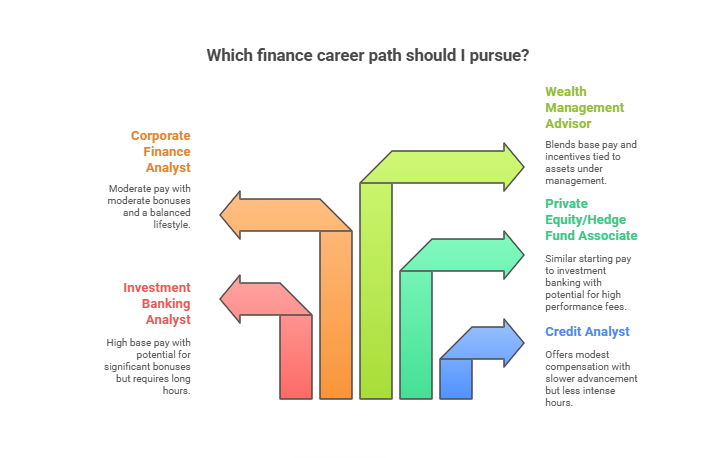
What I Learned About the Working in Finance Salary Range
Explore The Working In Finance Salary

I still remember the first time I wondered if the working in finance salary actually lives up to its reputation. To me, the finance world seemed like a place of big bonuses, long nights, and plenty of skyscraper offices. But as I dug deeper, I realized there is much more to the story than fancy suits and floor-to-ceiling windows.
My Intro To Finance Pay
When I started exploring finance career paths, I was surprised to see how pay scales vary wildly based on position, location, and even industry trends. For instance, a credit analyst in commercial banking typically earns less than an investment banker in New York. That difference isn’t just about cachet, it has to do with whether the job function is considered revenue-generating or support-based. According to Mergers and Inquisitions, credit analysts in smaller banks often work on loans for companies with less than $100 million in revenue. As a result, they may earn lower wages than investment bankers who handle multimillion-dollar deals.
I also learned that entry-level investment banking analysts can have base salaries in the range of £40,000 to £80,000, bolstered by performance-based bonuses that sometimes match or exceed their base pay (Capital City Training). These analysts work long hours, but many believe the trade-off is worth it for the potential seven-figure compensation down the road.
Understanding Different Finance Roles
The finance sector is not just about investment bankers. Here’s a snapshot of roles and their general pay trends:
- Credit Analyst: Often deals with smaller clients, lower fees, and more modest compensation. Advancement can lead to portfolio manager roles, but salary progression is usually slower.
- Investment Banking Analyst: Base pay can be high, but the bonus depends heavily on performance. Hours can be grueling, making it a fast-paced environment.
- Private Equity or Hedge Fund Associate: Similar starting salaries to investment banking, but real earning potential lies in performance fees (carry).
- Corporate Finance Analyst: Typically earns between $60,000 and $100,000 at entry-level, with moderate bonuses of around 10–30% of base pay. Directors and CFOs in large corporations can earn seven figures (Robert Half).
- Wealth Management Advisor: Compensation blends base pay and incentives tied to assets under management. Top wealth managers can earn notable bonuses but often less than high-level bankers or traders.
Appreciating Location-Based Discrepancies
I quickly realized geography can make or break your paycheck. In fact, 67% of employees in the United States expect their wage to be based on where they live (Slasify). If you’re working in a high-cost city like New York or San Francisco, your salary is likely to trend higher, but the increased living expenses and local competition also come into play. Meanwhile, remote work has pushed many companies to rethink pay policies, with 44% considering policy revisions to adapt to new work arrangements (Slasify).
Navigating Gender Pay Gaps
One aspect I couldn’t ignore is the gender-based pay gap, which remains a challenge in the financial sector. According to ADP research, the typical hourly wage is $40 for men and $27 for women in finance, leading to an average of 83 cents earned by women for every dollar a man earns (ADP). This shortfall is compounded by slower promotion timelines for women and high turnover rates in certain competitive roles. Still, initiatives like enhanced parental leave, mentoring programs, and government regulations are trying to level the playing field. Progress is gradually happening, but there is still room for growth.
Long-Term Growth And Key Takeaways
Over time, I realized that many finance professionals choose a role not just for the immediate paycheck but also for the potential long-term payoff. It might take 8–10 years to climb the ladder in some areas, like commercial banking, but the result can be a senior role with robust decision-making power. Some individuals pivot to private equity or corporate finance for higher mid-career earnings options.
If you’re handling substantial portfolios, you may also wonder about the cost of a financial advisor. Hiring a trusted advisor can help you maximize returns, manage taxes, and protect your wealth for the future. You might also look into tools like a mutual fund expense ratio calculator or an investment cost calculator to see how fees and expenses impact your net gains.
Wherever you land, don’t discount the importance of location, gender pay realities, and the specialized nature of your finance role. From my experience, it’s all about finding a balance between your personal interests, lifestyle preferences, and long-term earning goals.
If you’re wondering about working in finance salary details, here are five frequently asked questions in one quick sweep: do different roles pay differently, which cities pay best, does remote work affect wages, what’s the starting salary for new hires, and how does the gender pay gap factor in?
Feel free to explore more about specific roles, compare your options, and think about where you want your career to take you. I found that the financial world opens up countless possibilities, as long as you do your homework and plan for the lively ride ahead. If you have any tips or stories of your own, I’d love to hear them.
Recent Posts
Financial Advisors in Los Angeles to Consider
Finding the right financial advisor can be a pivotal step...
Financial Advisors in New York to Consider
Selecting the right financial advisors in New York can play...





